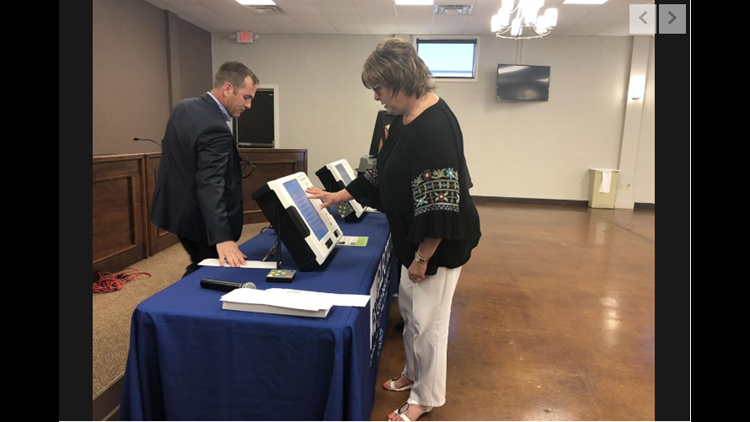SMITH COUNTY — New voting machines that Smith County officials are looking to buy in the coming months offer voters a hybrid experience that mixes paper and electronic ballots.
In conjunction with the company that makes the machines, the Smith County Elections Office gave a presentation to about a dozen stakeholders on Wednesday to demonstrate the machine's features.
Starting Thursday, and continuing every weekday next week, the machines will be on display in the lobby of the Smith County Elections Office at 302 E. Ferguson Street during normal business hours for members of the public to use and discuss with elections officials.
The Smith County Commissioners Court, which controls the county’s budget, gave preliminary approval at a meeting earlier this month to spend $1.3 million on the new machines to replace ones the county has had since 2005.
At the presentation on Wednesday, Chis Moody, the director of Texas sales and operations for Elections Systems and Software, demonstrated how the machines work to journalists, elected officials, and several representatives from political parties.
To use the machines, a voter is given a blank piece of paper that serves as a ballot. The voter then inserts the blank piece of paper in the machine, uses a touch screen to select candidates, and then prints out the ballot. A machine then counts the paper ballot.
“On hand-marked ballots, voters make mistakes,” Moody said. “They may fill in an oval for one candidate and then realize they made a mistake and, they may put a big X through it and fill in another one.”
He said the intent of a voter who fills out a paper ballot incorrectly is hard to determine, and local elections boards end up deciding the intent during recounts of paper ballots. In contrast, Moody said, “These machines don’t let you overvote. They’re not going to let you make mistakes.”
The machines are used only to fill out the ballot, and they do not record or store data, Moody said. The machines are not connected to the same electronic network—nor are they connected to the Internet—so there is no possibility of mass hacking.
Moody said the votes are recorded onto a proprietary, encrypted USB stick in the counting machine. He said if anyone tried to tamper with that encrypted USB stick, it would essentially shut down and the person wouldn’t be able to see the information.
All of the machines being discussed for purchase are accessible for people with disabilities. They can show different size fonts and screen backgrounds for people with visual impairments. The machines also offer audio capabilities and show ballot language in English and Spanish.
Smith County Commissioner JoAnn Hampton, who asked to have the machines available to the public, said it’s important for the county to be transparent and inclusive with the public.
“Once the public actually gets an opportunity to come in, look at the machines, try them out, hear them out, I think they’ll love them,” Hampton said.



